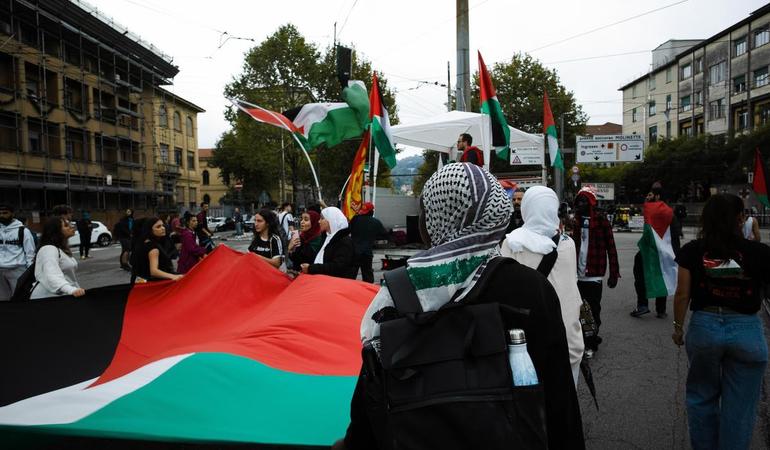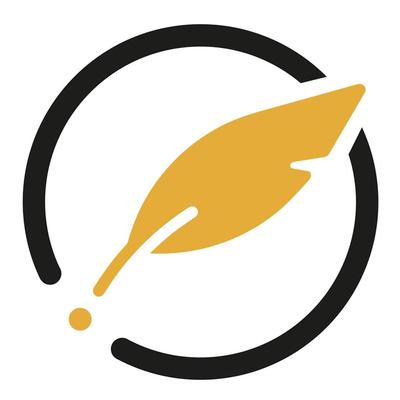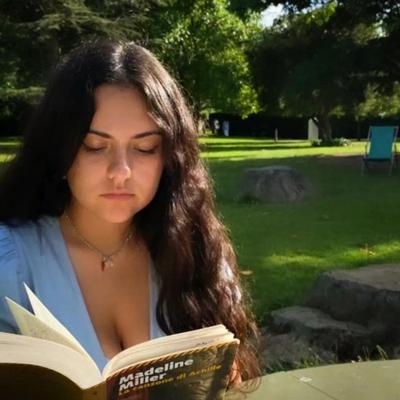
Gaza, il governo italiano sotto accusa per complicità in genocidio e nel blocco della Flotilla


12 febbraio 2024
Read the original article in Italian
Every exile begins differently. There are those who choose to study abroad and then realise they can never return home; those who have to pack their lives into a trolley bag in a matter of hours and jump on a plane to who knows where; those who are forced to cross a forest on foot, searching for a border in the dark. Mikhail, Valeria and Roman are three young Russian journalists who work for newspapers that have been silenced by Vladimir Putin's government. Today they are forced to live and work far from their country, but they still dream of returning home.
Mikhail Kalinin is 25 years old and a journalist for the independent online newspaper The Insider. Before Russia invaded Ukraine, he decided to move to Bologna to finish his university studies. Now he wants to return to Moscow, but the newspaper has been banned by Putin and he cannot go back. Growing up in the north-eastern part of the Russian capital, surrounded by the greenery of the country's oldest national park, Mikhail discovered his love of writing at primary school, when, at the age of 11, with a small notebook in his hands, he interviewed great people, including one of the liquidators of the Chernobyl disaster and the granddaughter of cosmonaut Yuri Gagarin.
Mikhail imagined himself as a journalist, travelling the world: "I didn't know how much reality was behind my dreams, I imagined that I would explore, that I would live from writing. In a way, that is what happened, although not in the way I expected.” In high school, he helped edit the school newspaper, then enrolled at university. “They didn't teach us propaganda,” he says, “during my studies, I did an internship at Novaya Gazeta, then a professor put me in touch with The Insider, where I work today. It is incredible to think how quickly things have changed.”
When Putin launched the invasion of Ukraine on 24 February 2022, both publications ended up on the Kremlin's blacklist and could no longer operate within Russian borders. "The label of 'foreign agent' or, even worse, 'undesirable organisation'," Mikhail explains, "means that no one can cooperate with these newspapers without putting themselves in danger. First there is talk of fines, then the risk of going to jail, or worse.”
Then the exodus of Russian free information begins. In the meantime, Mikhail had left the country to continue his studies abroad. I passed the exam for a master's degree in journalism and left for Bologna in September 2021. Mikhail remembers when things were different in his country. “Information has never been free in Russia, but there was a period, a very short moment, when it was freer than in the whole of its history. There were independent opposition media, and in general you could do your job without much fear. There were individual cases of persecution, but nothing like today. In 2014, with the invasion of Crimea, propaganda began to grip the country in a vice, and journalists found themselves in the government's crosshairs.”
From Bologna, Mikhail observes the horrors of war. “I lost my country in one day. First the censorship, then the military mobilisation. I was never able to return, and my parents still do not understand why.” No emotion, just a simple statement. “Their political ideas were different from mine, and that taught me tolerance, which for a journalist is as fundamental as freedom. When I left, I wasn't sure I wanted to spend my life in Russia, but I knew I could return to my family if I had to. Today I no longer have that certainty.”
Valeria Ratnikova, 25, is a journalist with the Moscow-based independent TV station Tv Rain, which has also been targeted by the Russian government and forced to leave the country. With the start of the special operation in Ukraine, Valeria moved first to Turkey, then to Georgia, Latvia and finally to the Netherlands, to Amsterdam, where the TV station has now reorganised its headquarters. "The journalism faculty is located in the heart of Moscow, from the windows you can see the golden domes of the Kremlin gleaming," says Valeria, reconstructing the beginning of her career.
“I liked writing and wanted to learn more. It was not a rational decision, I grew up in the suburbs, in one of those working-class neighbourhoods built for working-class families. The houses are all the same, there is a lot of tranquillity, but I wanted something different for my future.” In 2017, Valeria enrolled at Lomonosov, the Moscow State University, around the time that Aleksei Navalny would shock Russia with the Don't call him Dimon investigation.
"A journalist accusing the prime minister of corruption, unbelievable. I watched the protests, I felt the indignation of the people in the squares and I wanted to be part of it. I loved talking about politics, debating and confronting, unlike many of my comrades who did not feel the same urgency. It was at that moment that I really began to think about this profession.” At the time, Valeria was not afraid, not yet. "Navalny was a free man, there was nothing to worry about. He could write, work, even protest. But we were deluded, we thought that our leaders had to prove to our Western partners that there was freedom of expression here, that we were a democracy. It was all a farce.”
The situation changed with Navalny's poisoning. On the morning of 20 August 2020, the journalist collapsed and fell into a coma during a flight from Tomsk to Moscow. While he was being treated in Berlin, doctors found traces of Novichok, a nerve agent previously used against spies and dissidents, in his blood. “At the beginning of 2021, Navalny decided to return to Russia,” Valeria explains, “but they arrested him immediately, before he even had time to leave the airport. He is still in prison today, in Siberia.” The girl's voice betrays a certain anguish. "I think that was the moment when they started to prepare for war. They decided to destroy everything.”
After graduating, Valeria started working as a presenter at Tv Rain, which has always been opposed by the government since its creation in 2010. So it comes as no surprise that with the invasion of Ukraine on 1 March 2022, broadcasts were cancelled and the station's website blocked. "The last day of work was heartbreaking, I knew immediately that my life was going to change. In the middle of the night, I was woken up by messages from my colleagues that the police were searching our studios and homes. So I decided to leave, I didn't have much time, in two hours I packed what I could and the next morning I was in Turkey.”
Her father understands his daughter's decision, but her mother wants to keep her close. The chaos of Istanbul seemed to exacerbate the trauma of exile. Together with some colleagues, Valeria moved to Georgia, where she rebuilt her life and her work. “We didn't know where to start, we had to re-learn our trade from abroad, between vpn (virtual private networks) and YouTube channels. It's not easy to tell Russians about Russia if you don't work there.”
In July 2022, the broadcasts resumed from Latvia. “I met many Ukrainian refugees, they told me what was happening in their country and I was disgusted. It was this disgust that gave me the strength to become a journalist again.” In early December 2022, the broadcasting regulator in Riga revoked Tv Rain's licence for failing to comply with national regulations, and the station had to move Valeria for the umpteenth time, this time to Amsterdam. “In these two years I have lost all certainty, the future scares me because I know that nothing is stable, nothing is safe.”
“It is frightening not to be in control of your life, of your opinions. When I crossed the border, I felt only relief, because if you are not free to say what you think, you are not really a journalist.” Roman Dobrokhotov, born in 1983, is the founder of The Insider and Mikhail’s boss. His exile began long before the conflict in Ukraine: “In July 2021, police officers searched my house and confiscated my passport. They kept telling me that I was under investigation, but no case had yet been opened in my name. I now know that Putin was preparing the invasion. He could not face an internal war, so he had to get rid of all the opposition somehow.”
A month later, Roman reached the Ukrainian border. On foot, at night and without papers, he crossed the forest. Since then he has travelled all over Europe, but his work has never stopped and The Insider continues to be one of the most influential voices of opposition. "The paper started in 2013 as a niche, partly because investigative journalism wasn't widespread in Russia. We started it and tried to make it financially independent from the state, so it was somewhat incentivised. And for a while we even succeeded.”
In 2000, Putin had just been elected president and one of his first political acts was censorship. "He listed all the major TV stations and tried to control them, including arrests, disappearances and money laundering. Even today, in some parts of Russia, TV is the only medium of information available, so if you have TV, you have power. It was clear that once this problem was solved, attention would move elsewhere, to other media.”
At first the government was not interested in the smaller media, but in 2021 things changed. “In July of that year, the usual mechanism was set in motion," recalls Roman, "the newspaper was first declared a foreign agent and then an undesirable organisation. This meant that it could no longer operate in Russia.” Although in exile, The Insider continues to fight: “We must fight for our fellow citizens, satisfy their hunger for information that is not propaganda. Only then, perhaps, can independent journalism return to Russia.”
Every exile begins differently, but ends the same way: with a shattering hope. Roman has a new apartment waiting for him in Moscow: “I remember that I have a home to come back to.” Valeria wakes up and goes to sleep every day with the same thought: “The goal of my life is to return to Russia.” Mikhail is no longer sure: “Maybe one day I will return to Russia, but only when Putin's regime falls and information is free.”
La tua donazione ci servirà a mantenere il sito accessibile a tutti
La tua donazione ci servirà a mantenere il sito accessibile a tutti